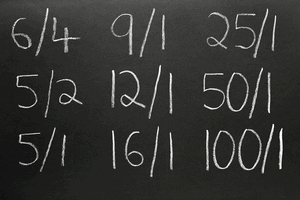 In the world of sports betting, any advantage one can gain over the bookmakers must be seen as a good thing.
In the world of sports betting, any advantage one can gain over the bookmakers must be seen as a good thing.
It is with this in mind that some clever nerds invented sports betting algorithms, which use complicated computer programs to try to find profitable sports betting opportunities. Because they use computers, such programs are able to analyse huge amounts of data in order to calculate numerous different possibilities.
Conversely the betting sites themselves now create most of their odds using algorithms, especially for fast moving markets such as in-play. It is becoming a battle between the punter and the bookie to use ever more powerful data processing to try to find an edge. This is only going to increase in the future as computers inevitably get more powerful.
There are, of course, numerous different types of sports betting algorithms. In the majority of cases, such algorithms work to compare the probability of countless different outcomes and then compare those probabilities to the odds offered by bookmakers in order to discover which bets are the most worth placing. In essence, there are two different types of sports betting algorithms, which are separated by what they hope to achieve.
Betting Algorithms Explained
![]() The two different types of sports betting algorithms can best be summed up by referring to the first as betting arbitrage algorithms and the second as value betting algorithms. In many ways, they work in a similar manner to each other and their main aim is to make the users money. They can be used both by betting site operators and by punters hoping to get one over on them, though fewer of the latter have access to such algorithms.
The two different types of sports betting algorithms can best be summed up by referring to the first as betting arbitrage algorithms and the second as value betting algorithms. In many ways, they work in a similar manner to each other and their main aim is to make the users money. They can be used both by betting site operators and by punters hoping to get one over on them, though fewer of the latter have access to such algorithms.
Algorithms are, in essence, mathematical formulas that look to organise and evaluate any data that is put into them in order to solve complex problems or answer difficult questions. When it comes to betting algorithms, the information is put into them tends to be things such as statistics of players and teams that will be taking part in a match. Because of this, it’s fair to say that sports betting algorithms deal with relatively straightforward information.
The simple fact is that there is a huge amount of data available to the public on all sorts of sports, but especially the likes of Premier League football. Indeed, some companies specialise in the Premier League and other English football divisions for this exact reason. Large sets of statistical analysis is available at the click of a button, which dramatically increases what algorithms are able to achieve.
The more information available to an algorithm, the more accurate and successful it is likely to be. The best sports betting algorithms therefore tends to combine publicly available information with ever improving technology. One thing that some sports betting algorithm makers are looking to do is create neural networks, which allows for a form of machine learning. The more a machine learns, the more successful it will be.
Exploring Neural Networks
 We could write an entire page about neural networks, but instead will try to sum it up here. Neural networks are essentially programs that have been built with the aim of mimicking the operation of the human brain.
We could write an entire page about neural networks, but instead will try to sum it up here. Neural networks are essentially programs that have been built with the aim of mimicking the operation of the human brain.
Building such neural networks into machine learning algorithms is one way of improving their ability to solve difficult problems. As technology develops, so does the ability of machine learning algorithms.
Given the huge amount of money that is spent every single year on the global sports betting market, machine learning algorithms have the potential to be a game changer for anyone with the ability to create one.
If machines were able to copy the workings of the human brain but without any of the fallibility, then bookmakers would doubtless soon be looking over their shoulders fearing how much money they could lose.
Do They Learn
 Elsewhere on this site you can learn about quantum computing and the extent to which it could completely change the manner in which major corporations deal with their betting.
Elsewhere on this site you can learn about quantum computing and the extent to which it could completely change the manner in which major corporations deal with their betting.
Obviously what we’re talking about here is a different kettle of fish, but it’s still the same ballpark. The top designers of sports betting algorithms use machine learning to create exceptionally brilliant programs that can process and analyse large amounts of data.
The more data that is inputted into a sports betting algorithm, the more information it has and the more that it can fine-tune its workings. The algorithms are improving all the time, becoming more precise and more accurately engineered with every passing moment.
They don’t technically learn in the same way that quantum computing allows for, but the more that they develop, the better that they will get and the more accurate the results.
Who Makes Them?
 There are large numbers of companies that have seen the benefits of using sports betting algorithms to improve their gambling techniques. One such company is called Stratagem. They are one of the aforementioned companies that believes that football is one of the world’s most predictable sports. They rely on things such as the short duration of matches, the fixed rules and the repeatable nature of the games.
There are large numbers of companies that have seen the benefits of using sports betting algorithms to improve their gambling techniques. One such company is called Stratagem. They are one of the aforementioned companies that believes that football is one of the world’s most predictable sports. They rely on things such as the short duration of matches, the fixed rules and the repeatable nature of the games.
They make the point that if you look at 100,000 football matches, there will be patterns that machines can use to analyse future matches. Stratagem wish to look at such patterns and use them to gain an advantage over bookmakers. By finding such patterns and then factoring them into bets, the company believes that there is a huge amount of money to be made and it would be difficult to disagree with them.
Stratagem are just one example of a company using machine learning and proprietary technology to develop algorithms that are incredibly well suited to taking on the bookies. At the time of writing the company has not yet been able to develop an algorithm that can watch live events and offer suitable insights. The likes of video replays cause havoc to the way in which they work.
In addition to companies, there are also any number of entrepreneurs who are also looking to develop sports betting algorithms. In the age of ever developing computer programming, it’s no surprise that computer algorithms are being used to process data faster and more accurately than ever before. Another key factor is that they remove both human error and innate human bias that comes from the likes of emotional investment.
Real World Applications
 We have already seen machine learning algorithms being used successfully in the world of finance. In fact, many of those that have been successful with such algorithms in finance are the same people that are now looking to make it work in sports betting. In fact, such machine learning algorithms have been being used in the financial world since the 1980s. They are so prevalent, any financial institution Worth working with uses such algorithms.
We have already seen machine learning algorithms being used successfully in the world of finance. In fact, many of those that have been successful with such algorithms in finance are the same people that are now looking to make it work in sports betting. In fact, such machine learning algorithms have been being used in the financial world since the 1980s. They are so prevalent, any financial institution Worth working with uses such algorithms.
When it comes to the manner in which sports betting algorithms can be used in the real world, it doesn’t take a huge leap of the imagination. Whether it be that you wish to have a better indication of which matches you should choose for an accumulator bet or simply just to have a wager on the outcome of an individual game, the reality is that a successful Sports betting algorithm Will give you a heads up over the bookmakers.
Of course, bookmakers aren’t stupid. The more that sports betting algorithms are developed, the more likely it is that the world’s best bookies will have algorithms of their own at play. They will input information from algorithms in order to ensure that their odds give them the best chance of profit. A bookmaker’s algorithm will include their over round, which is put into odds to hand them the advantage.
When betting in the real world, you need to make sure that you stand the best possible chance of making a profit of your own. It goes without saying that it’s entirely possible to create an algorithm that could do that for you. That is yet another real-world application of a sports betting algorithm that would allow punters to maximise the amount of money that they make from their betting.
Value Betting Algorithms
 We mentioned elsewhere on this page that there are two main types of sports betting algorithms. One of those is value betting algorithms, which are arguably the more popular of the two. Value betting algorithms firstly need to find bets that present punters with expected value. This involves finding bets that have an expected value greater than the stake you are looking to place.
We mentioned elsewhere on this page that there are two main types of sports betting algorithms. One of those is value betting algorithms, which are arguably the more popular of the two. Value betting algorithms firstly need to find bets that present punters with expected value. This involves finding bets that have an expected value greater than the stake you are looking to place.
Betting algorithms tend to rely on past data and by looking at how often certain outcomes of occurred in the past, algorithms can theoretically predict what will happen in a future football match. An example of this would be a football team that tends to score an average of two goals per game, meaning that a bet on over 1.5 goals would make sense and might be something that a value betting algorithm suggests.
The art of making money with value betting algorithms isn’t just about finding good value bets, but is also about managing your bank roll. This includes adapting how big or small your bets are depending on your confidence of the outcome. Of course, Sports betting algorithms that are based around value betting should give you a sense of the likelihood of the outcome suggested coming true.
Betting Arbitrage Algorithms
 The other type of sports betting algorithms is arbitrage algorithms. This is where your algorithm takes advantage of the changing odds of certain outcomes in sports matches.
The other type of sports betting algorithms is arbitrage algorithms. This is where your algorithm takes advantage of the changing odds of certain outcomes in sports matches.
This often involves using betting exchanges and using the discrepancy in the odds to ensure a profit regardless of the outcome of the event. Whilst these situations aren’t common, they do happen and such algorithms are well placed to take advantage.
There is not necessarily a huge amount of money to be made via betting arbitrage algorithms, but they do provide a regular income by looking at patterns in odds and finding the value. There can be problems with this, such as bookmakers looking to limit your accounts because they don’t like losing money.
It’s highly unlikely that you’ll find your betting account limited, but fixed odds bookmakers have their own algorithms in place to look out for punters trying to do this.
Flaws In The System
 As things currently stand, the truth about sports betting algorithms is that they are far from flawless. It is interesting, for example, that Stratagem have chosen to focus on football as their main sport of interest. Football is a sport in which the underdog can often win due to the low scoring nature of the game. It would be difficult for a sports based betting algorithm to take into account the vagaries of randomness that football sometimes throws up.
As things currently stand, the truth about sports betting algorithms is that they are far from flawless. It is interesting, for example, that Stratagem have chosen to focus on football as their main sport of interest. Football is a sport in which the underdog can often win due to the low scoring nature of the game. It would be difficult for a sports based betting algorithm to take into account the vagaries of randomness that football sometimes throws up.
Between April 2017 and January 2021, for example, Liverpool Football Club went 68 games without losing at home. That included 55 wins and 13 draws over a period of three years and 273 days. Only Chelsea’s run of 86 games between February of 2004 and October 2008 is ahead in terms of time spent unbeaten at home. After defeat to Burnley broke Liverpool’s unbeaten home record, the Reds went on to lose a further five matches at Anfield.
It is difficult to imagine a sports betting algorithm that would’ve been able to predict such a sharp turn in fortunes for the Merseyside club. Whilst an algorithm would’ve been able to take into account the likes of losing Alisson Becker, Virgil van Dijk and Joe Gomez to injury, it’s highly unlikely that would’ve been able to predict quite how much of an affect the loss of those players would have on the team overall.
Other issues with sports betting algorithms include the earlier mentioned problem of bookmakers that limit the accounts of successful punters. The better your algorithm is, the more likely it is that your bookies of choice will either stop taking your bets or else limit how much you’re able to win. Whilst this might not seem fair, it is entirely legal and quite common practice amongst fixed odds bookmakers.
The final thing worth mentioning is the fact that sports betting algorithms constantly need to be updated. Though the best programmers can develop programs to do this for them, there is a need to update the software behind the algorithm in order to ensure that it’s operating at its peak level and is constantly providing the user with the best value available. That being said, if they do their job then this is a small price to pay.